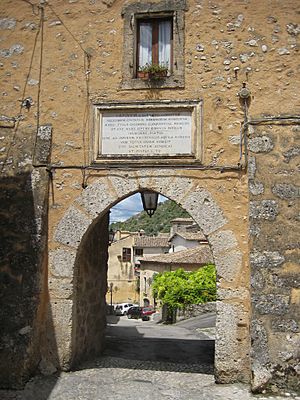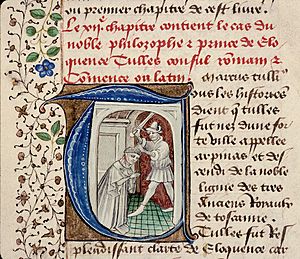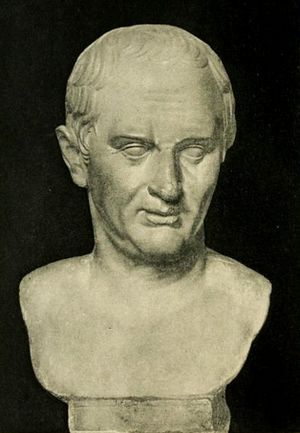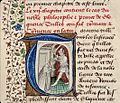Cicero facts for kids
Quick facts for kids
Cicero
|
|
|---|---|
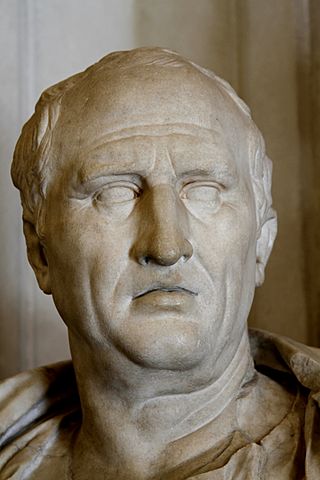
First-century AD bust of Cicero at the Capitoline Museums, Rome
|
|
| Consul of the Roman Republic | |
| In office 63 BC – 63 BC Serving with Gaius Antonius Hybrida
|
|
| Governor of Cilicia | |
| In office 51 BC – 50 BC |
|
| Personal details | |
| Born | 3 January 106 BC Arpinum, Italy, Roman Republic |
| Died | 7 December 43 BC (aged 63) Formia, Italy, Roman Republic |
| Spouses |
|
| Children | Tullia and Cicero Minor |
| Relatives | Quintus Tullius Cicero (brother) |
| Occupation | Statesman, lawyer, writer, orator |
|
Philosophy career |
|
|
Notable work
|
Orations
Philosophical works
|
| Era | Hellenistic philosophy |
| Region | Western philosophy |
| School |
|
|
Main interests
|
|
|
Notable ideas
|
|
|
Influenced
|
|
Marcus Tullius Cicero (born January 3, 106 BC – died December 7, 43 BC) was a very important person in Ancient Rome. He was a statesman, a lawyer, a scholar, and a philosopher. Cicero tried to protect the Roman Republic during a time of big political problems. These problems eventually led to the Roman Empire.
Cicero wrote many books and speeches about how to speak well (called rhetoric), about philosophy, and about politics. People think he was one of Rome's best speakers and writers. He came from a rich family that was not part of the old Roman noble class. He became a consul, which was the highest elected job in Rome, in 63 BC.
His writing style had a huge impact on the Latin language. He wrote a lot of the Latin literature that still exists from his time. Many people say that later Latin writing was either like his style or a reaction against it. Cicero also brought many ideas from Ancient Greek philosophy into Latin. He even created new Latin words for philosophical ideas.
Even though he was a great speaker and lawyer, Cicero thought his political career was his most important achievement. During his time as consul, he stopped a plot by Catiline to overthrow the government. He had five plotters executed without a trial, which was very controversial. Later, during civil wars and the rule of Julius Caesar, Cicero wanted to bring back the old republican government. After Caesar died, Cicero became an enemy of Mark Antony. He gave many speeches against Antony. Because of this, he was declared an enemy of the state and was killed in 43 BC.
Many centuries later, in the 1300s, people rediscovered Cicero's letters. This helped start the Renaissance, a time of great learning and art. His ideas influenced important thinkers like John Locke and Montesquieu. Today, his writings are still very important for understanding the end of the Roman Republic.
Contents
Cicero's Life Story
Growing Up in Rome
Marcus Tullius Cicero was born on January 3, 106 BC. His hometown was Arpino, a hill town about 100 kilometers (60 miles) southeast of Rome. His father was a wealthy man from the equestrian class. This class was made up of rich Romans who were not nobles. Cicero's father had good connections in Rome.
Cicero's family name, Cicero, comes from the Latin word for "chickpea." Some say it was because an ancestor had a nose shaped like a chickpea. But it's more likely his family made money from growing and selling chickpeas. Romans often had simple family names. For example, the famous families Fabius, Lentulus, and Piso were named after beans, lentils, and peas. Cicero was told to change his name when he started in politics, but he refused. He said he would make the name Cicero famous.
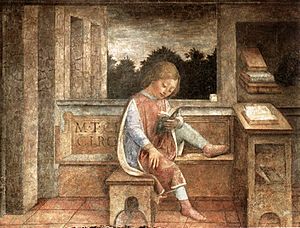
In ancient Rome, being "cultured" meant you could speak both Latin and Greek. Cicero learned a lot from ancient Greek philosophers, poets, and historians. He learned how to speak well (rhetoric) from Greek teachers like Aulus Licinius Archias and Apollonius Molon. Cicero used his Greek knowledge to translate Greek philosophy into Latin. This helped more Romans understand these ideas. His wide education connected him to the traditional Roman elite.
Cicero loved philosophy. This interest shaped his later career. He wrote a lot about Greek philosophy for Roman readers. He even created new Latin words for philosophical terms. In 87 BC, Philo of Larissa, a famous Greek philosopher, came to Rome. Cicero was very eager to learn from him. He studied a philosophy called Academic Skepticism. Cicero once said that if the god Zeus were to speak, he would use the language of Plato's writings.
Cicero was a very talented student. People all over Rome noticed his learning. He studied Roman law with Quintus Mucius Scaevola. His fellow students included Servius Sulpicius Rufus, who became a famous lawyer, and Titus Pomponius Atticus. Atticus became Cicero's lifelong friend. Cicero called him "like a second brother."
In 79 BC, Cicero traveled to Greece and other places. He said he wanted to improve his speaking skills and physical fitness. In Athens, he studied philosophy. He also met leading speakers in Asia Minor. Then he went to Rhodes to study again with his old teacher, Apollonius Molon. Molon helped Cicero refine his speaking style. Cicero became known as one of history's greatest speakers.
Cicero's Family Life
Cicero married Terentia when he was about 27 years old, in 79 BC. This marriage lasted for almost 30 years. Terentia's family was wealthy, which helped Cicero's political goals. She was a strong-willed woman. It is said she cared more about her husband's political career than about household matters.
Later, Cicero's letters to Terentia became shorter and colder. He complained to friends that she had betrayed him, but he didn't say how. Their marriage might have struggled because of the political chaos in Rome. They divorced around 51 BC. In 46 or 45 BC, Cicero married a young woman named Publilia. She had been his ward (someone he was responsible for). Cicero probably needed her money, especially after repaying Terentia's dowry. This second marriage did not last long.
Cicero deeply loved his daughter, Tullia. In February 45 BC, she became sick and died. Cicero was heartbroken. He wrote to his friend Atticus, "I have lost the one thing that bound me to life." Atticus invited him to visit to comfort him. Cicero read many Greek philosophy books about dealing with sadness. But he said, "my sorrow defeats all consolation." Even Julius Caesar and Marcus Junius Brutus sent him letters of sympathy.
Cicero hoped his son, Marcus, would become a philosopher like him. But Marcus wanted a military career. He joined Pompey's army in 49 BC. After Pompey's defeat, Caesar pardoned Marcus. Cicero sent him to Athens to study. But Marcus used this time away from his father to "eat, drink and be merry." After Cicero's death, Marcus joined the army against Caesar's killers. Later, Augustus pardoned him. Augustus helped Marcus's career because he felt bad about Cicero's death. Marcus became a consul in 30 BC with Augustus. In this role, he was able to take revenge on Mark Antony, who was responsible for his father's death. Later, Marcus was a governor in Syria and Asia.
Cicero's Public Career
Starting as a Lawyer
Cicero wanted a public career in politics. This meant following the steps of the cursus honorum, a series of government jobs. From 90–88 BC, he served in the Social War. But he didn't enjoy military life; he was more of an intellectual.
Cicero began his career as a lawyer around 83–81 BC. His first known speech was for a private case in 81 BC. His first big public case was in 80 BC. He defended Sextus Roscius, who was accused of killing his father. This was a very brave move for Cicero. The people he accused of the murder were favorites of Sulla, a powerful dictator. Sulla could have easily had Cicero killed. Cicero's defense was a challenge to Sulla's power. Roscius was found innocent. Soon after, Cicero again criticized Sulla in another speech.
In the Roscius case, Cicero showed how a simple farmer's son would not gain anything by killing his father. He would inherit the land anyway. Cicero then focused on the greed of the accusers. He said they were more likely to be the murderers. He also showed that a powerful man named Chrysogonus was behind the false accusation. Cicero used his speaking skills to make Chrysogonus look like a bad person.
Early Political Steps
Cicero's first government job was as a quaestor in 75 BC. Quaestors managed public money and administration. Cicero served in western Sicily. He was honest and fair to the people there. Because of this, the Sicilians asked him to prosecute Gaius Verres. Verres was a governor who had stolen a lot from the province.
Cicero's prosecution of Verres was a huge success. Verres hired Quintus Hortensius Hortalus, a very famous lawyer. Cicero spent a long time in Sicily gathering evidence and witnesses. He returned to Rome and won the case in dramatic court battles. His unique speaking style made him stand out from Hortensius. After this case, Cicero was seen as the greatest speaker in Rome. Some believe Cicero took the case to beat Hortensius and gain fame.
Cicero grew up during a time of civil unrest. Sulla's victory in civil war changed the Roman government. It weakened libertas (liberty), a key value of the Republic. But Sulla's changes also helped the equestrian class, which was gaining political power. Cicero was from this class and was a "novus homo" (new man) in politics. He was also loyal to the Republic. This helped him gain support from ordinary people and the Italian middle classes. However, the old noble families (the optimates) never fully accepted Cicero. This made it harder for him to reform the Republic. Still, he moved up the cursus honorum quickly. He became quaestor at 30, aedile at 36, and praetor at 39. He was elected consul at age 42.
Cicero as Consul
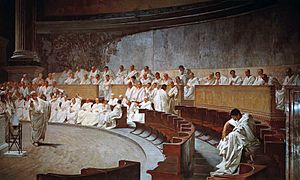
Cicero became consul in 63 BC. He had the support of many groups, including the common people and leaders from towns across Italy. His co-consul, Gaius Antonius Hybrida, played a smaller role.
He started his year as consul by opposing a land bill. This bill would have given too much power to commissioners. Cicero also worked in the courts. He defended Gaius Rabirius, who was accused of killing a tribune in 100 BC. Cicero argued that using force was allowed in extreme situations to protect the state. This argument would be similar to how he used force later.
Stopping the Catiline Conspiracy
Cicero's most famous achievement was stopping a plot led by Catiline. Catiline wanted to overthrow the Roman Republic with an army. Cicero got the Senate to issue a special decree (the senatus consultum ultimum). This decree allowed him to use force to protect the state. He then gave four powerful speeches, known as the Catiline Orations. These speeches drove Catiline out of the city. Cicero described Catiline's bad behavior and criticized his supporters in the Senate. He demanded that Catiline and his followers leave Rome. After Cicero's first speech, Catiline quickly left the Senate. Cicero gave his other speeches to the public and the Senate. He wanted to prepare them for the worst and showed more evidence against Catiline.
Catiline fled, leaving his followers to start the revolution from inside Rome. He planned to attack the city with his army. Catiline also tried to get help from the Allobroges, a tribe from Gaul. But Cicero worked with the Gauls and seized letters that proved the plot. He forced five conspirators to confess in front of the Senate. The Senate then debated what to do with them. Normally, they would be put under house arrest or exiled. But martial law was in effect, and these options seemed too risky.
At first, Decimus Junius Silanus suggested the death penalty. Many were swayed by Julius Caesar, who argued against it, saying it would set a bad example. He suggested life imprisonment instead. But Cato the Younger spoke strongly for the death penalty. In the end, the entire Senate agreed to execute the conspirators. Cicero himself took one of the conspirators, Publius Cornelius Lentulus Sura, to the Tullianum, a famous Roman prison, where they were killed.
Cicero was given the title "Pater Patriae" (Father of the Country) for stopping the conspiracy. But he worried about being put on trial or exiled for executing Roman citizens without a trial. He argued that the special decree allowed him to use force. He also said that Catiline's plot was treason, so the conspirators lost their rights as Roman citizens. The consuls acted quickly. Antonius Hybrida defeated Catiline's army in battle that year.
After stopping the plot, Cicero was very proud. Some of his enemies said he exaggerated his success. He also overestimated his popularity later when he was exiled and then allowed to return. He thought the Republic would be restored with him. Many Romans, including Julius Caesar and Publius Clodius Pulcher, believed Cicero's evidence against Catiline was fake. Cicero, who was supported by the old noble families, resisted social changes.
After his consulship, Cicero bought a large house on the Palatine Hill in Rome. It cost a huge amount of money. He got a loan from his co-consul, Hybrida. Cicero had made a deal with Hybrida to give him the rich province of Macedonia in exchange for a share of the profits. Cicero was proud of his lavish house, which he said was "in sight of nearly the whole city." It was also close to the Roman Forum.
Exile and Return
In 60 BC, Julius Caesar invited Cicero to join his powerful alliance with Pompey and Marcus Licinius Crassus. This group later became known as the First Triumvirate. Cicero refused. He thought it would harm the Republic.
During Caesar's time as consul in 59 BC, the Triumvirate achieved many of their goals. They wanted to keep their power. They helped Publius Clodius Pulcher become a tribune for 58 BC. Clodius used the Triumvirate's support to pass popular laws. Then, he turned on Cicero. He threatened to exile anyone who had executed a Roman citizen without a trial. This was clearly aimed at Cicero, who had executed the Catiline conspirators. Many believed Clodius was working with the Triumvirate. They feared Cicero would try to undo Caesar's changes. Cicero argued that the Senate's decree protected him. He tried to get support from senators and Pompey.
Cicero grew his hair long and wore mourning clothes. He walked through the streets. Clodius's gangs followed him, shouting insults. The Senate and consuls were scared. Caesar, who was near Rome, said he couldn't help. Everyone seemed to have abandoned Cicero.
Clodius passed a law that denied Cicero "fire and water" (shelter) within 400 miles of Rome. Cicero went into exile. He arrived in Thessaloniki on May 23, 58 BC. While he was away, Clodius had Cicero's house confiscated. Clodius even bought part of the property to make his own house bigger. After destroying Cicero's house, Clodius put up a temple of Liberty on the spot.
Cicero became very depressed during his exile. He wrote to Atticus, "What is there to live for? My troubles are worse than anything you've ever heard." Later, a tribune named Titus Annius Milo helped Cicero. Pompey also wanted Cicero back. The Senate voted to recall Cicero from exile. Clodius was the only one who voted against it. Cicero returned to Italy on August 5, 57 BC. He landed at Brindisi and was met by a cheering crowd. He was delighted to see his daughter, Tullia. Cicero convinced the College of Pontiffs (religious leaders) that his land had been wrongly taken. This allowed him to get his property back and rebuild his house.
Cicero tried to get back into politics on his own. But his attempts to attack Caesar's laws failed. This made Caesar strengthen his alliance with Pompey and Crassus. A meeting in Luca in 56 BC showed that the three-man alliance controlled Roman politics. Cicero was forced to support them. He praised Caesar's achievements and got the Senate to vote thanks for Caesar's victories. He also helped Caesar keep his provinces in Gaul. After this, Cicero focused on his writings. It's not clear if he was directly involved in politics for the next few years.
Governor of Cilicia
In 51 BC, Cicero reluctantly became a governor (proconsul) in Cilicia for a year. He arrived in August. He was told to keep nearby Cappadocia loyal to King Ariobarzanes III. He did this peacefully. In 53 BC, Marcus Licinius Crassus had been defeated by the Parthians. This made the Roman East vulnerable to a Parthian invasion. It caused unrest in Syria and Cilicia. Cicero brought calm by ruling fairly. He found that previous governors had stolen a lot of public money. He worked hard to get it back. He also spent very little on his own expenses. This made him very popular with the local people.
Cicero was also active in the military. He heard that the Parthian prince Pacorus had crossed the Euphrates river. Pacorus was attacking Syria and had besieged Gaius Cassius Longinus in Antioch. Cicero marched with his legions to help Cassius. But Pacorus had already given up the siege and was heading south. Cassius and his legions followed and defeated them near Antigonea. Cicero's cavalry also defeated a large group of Parthian horsemen. Cicero then defeated robbers on Mount Amanus. His troops called him "imperator" (victorious commander). He then attacked independent Cilician mountain tribes. He besieged their fortress of Pindenissum. It took him 47 days to capture it in December. On July 30, 50 BC, Cicero left the province to his brother, Quintus Tullius Cicero. On his way back to Rome, he visited Rhodes and Athens. He met his old friend Atticus and other learned men.
Julius Caesar's Civil War
Cicero arrived in Rome on January 4, 49 BC. He stayed outside the city limits. This was to keep his powers as a former governor, either hoping for a triumph or to keep his command in the coming civil war. The conflict between Pompey and Julius Caesar became very intense in 50 BC. Cicero supported Pompey. He saw Pompey as a defender of the Senate and the Republic. But at first, he avoided openly offending Caesar.
When Caesar invaded Italy in 49 BC, Cicero fled Rome. Caesar wanted Cicero's support. But Cicero secretly left Italy and went to Dyrrachium, where Pompey's forces were. Cicero traveled with Pompey's army to Pharsalus in 48 BC. However, he was losing faith in Pompey's side. He even angered Cato the Younger, who told him he would have been more useful in Rome. After Caesar's victory at the Battle of Pharsalus on August 9, Cicero refused to lead Pompey's forces and continue the war. He returned to Rome in 47 BC. Caesar pardoned him. Cicero tried to adapt and continue his political work. He hoped Caesar might bring back the Republic.
Cicero was completely surprised when Caesar was assassinated on March 15, 44 BC. Cicero was not part of the plot. But Marcus Junius Brutus, one of the plotters, called out Cicero's name, asking him to restore the Republic. Cicero later wrote that he wished he had been invited to that "most glorious banquet." Cicero became a popular leader after the assassination. He disliked Mark Antony, who wanted revenge on Caesar's killers. Cicero helped the Senate agree not to call Caesar a tyrant. This allowed Caesar's supporters to keep his reforms.
Against Mark Antony and Death
Cicero and Antony became the two most important men in Rome. Cicero spoke for the Senate. Antony was consul and a leader of Caesar's supporters. They were never friends. Their relationship got worse when Cicero said Antony was misinterpreting Caesar's wishes. Octavian was Caesar's adopted son and heir. When he returned to Italy, Cicero tried to use him against Antony. He praised Octavian. He attacked Antony in a series of speeches called the Philippics. At this time, Cicero was very popular.
Cicero supported Decimus Junius Brutus Albinus as governor of Cisalpine Gaul. He urged the Senate to declare Antony an enemy of the state. Antony was later declared an enemy when he refused to stop besieging Modena. Cicero's plan to defeat Antony failed. Antony and Octavian then made peace. They allied with Marcus Aemilius Lepidus to form the Second Triumvirate. This alliance was made official for five years. The Triumvirate immediately began to list their enemies to be killed. Cicero and his supporters were on this list. Octavian argued for two days against including Cicero, but he eventually gave in.
Cicero was one of the most hunted men on the list. Many people felt sympathy for him and refused to report seeing him. He was caught on December 7, 43 BC. He was leaving his villa in Formia in a litter (a kind of covered chair carried by people). He was heading to the sea, hoping to sail to Macedonia. When his killers arrived, Cicero's slaves said they hadn't seen him. But a freedman of his brother, Philologus, gave him away.
According to some historians, Cicero's last words were: "I go no further: approach, veteran soldier, and, if you can at least do so much properly, sever this neck."
Cicero's son, Marcus Tullius Cicero Minor, became a consul in 30 BC. He got some revenge for his father's death. He announced to the Senate Mark Antony's naval defeat at Actium in 31 BC by Octavian.
Later, Octavian (who became Emperor Augustus) reportedly praised Cicero as a patriot and scholar. However, it was Octavian's agreement that allowed Cicero to be killed.
Cicero's political career had some ups and downs. He sometimes changed his position depending on the political situation. Some say this was because he was sensitive and easily influenced. A Roman statesman and historian, Gaius Asinius Pollio, wrote: "Would that he had been able to endure prosperity with greater self-control, and adversity with more fortitude!"
Cicero's Lasting Impact
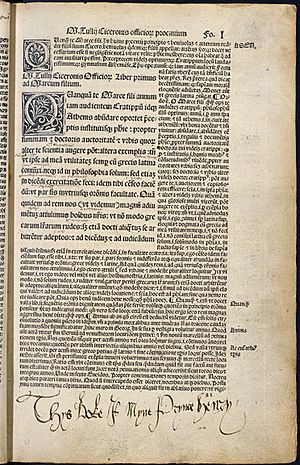
Cicero is known as the master of Latin writing. The famous Roman teacher Quintilian said Cicero was "not the name of a man, but of eloquence itself." English words like "Ciceronian" (meaning eloquent) and "cicerone" (meaning a local guide) come from his name. He is credited with making Latin a rich language that could express complex ideas clearly. Julius Caesar praised Cicero for expanding the "frontiers of the Roman spirit."
Cicero wrote a lot about many topics. He followed the Greek traditions of philosophy and rhetoric. His writings were easy to find and were used in schools. A message found in Pompeii said: "You will like Cicero, or you will be whipped."
Important early Christian leaders admired Cicero. Augustine of Hippo said Cicero's lost work Hortensius helped him become a Christian. Jerome had a dream where he was accused of being a "follower of Cicero and not of Christ." More of Cicero's writings survived the Early Middle Ages than any other Latin author. Medieval philosophers were influenced by his ideas on natural law and rights.
When Petrarch rediscovered Cicero's letters, it sparked a search for other ancient Greek and Latin writings. This led to the Renaissance. Cicero became so important that some scholars said only words found in Cicero's works should be used in Latin.
His many letters, especially to his friend Atticus, were very influential. They taught Europeans how to write refined letters. A biographer named Cornelius Nepos said Cicero's letters had so much detail about important people and government changes that you didn't need a history book.
Cicero was admired by thinkers like Erasmus, Martin Luther, and John Locke. After the printing press was invented, Cicero's De Officiis was the second book printed in Europe, after the Gutenberg Bible. Scholars say Cicero influenced the idea of religious tolerance in the 1600s.
Cicero was very popular with 18th-century thinkers like Edward Gibbon and Voltaire. Gibbon said reading Cicero made him appreciate the language and the spirit of freedom. Voltaire called Cicero "the greatest as well as the most elegant of Roman philosophers." He even wrote a play about Cicero's role in the Catiline conspiracy. Montesquieu praised Cicero for bringing philosophy to more people. He said Cicero was "of all the ancients, the one who had the most personal merit."
Cicero's ideas about the Republic inspired the Founding Fathers of the United States and French revolutionaries. John Adams said, "As all the ages of the world have not produced a greater statesman and philosopher united than Cicero, his authority should have great weight." Thomas Jefferson named Cicero as one of the key figures who shaped the idea of public rights.
However, not everyone liked Cicero. Some criticized him for supporting the rich and opposing changes for the poor. Friedrich Engels called him "the most contemptible scoundrel in history." Cicero has been criticized for making Roman democracy seem better than it was. He also defended the rich against Caesar's popular reforms. Michael Parenti said Cicero was vain and hypocritical. He also said Cicero's prosecution of the Catiline conspiracy was legally flawed.
Cicero also influenced modern astronomy. Nicolaus Copernicus, who developed the sun-centered model of the universe, found in Cicero's writings that an ancient thinker named Hicetas believed the Earth moved.
Images for kids
See also
 In Spanish: Cicerón para niños
In Spanish: Cicerón para niños
 | Tommie Smith |
 | Simone Manuel |
 | Shani Davis |
 | Simone Biles |
 | Alice Coachman |


